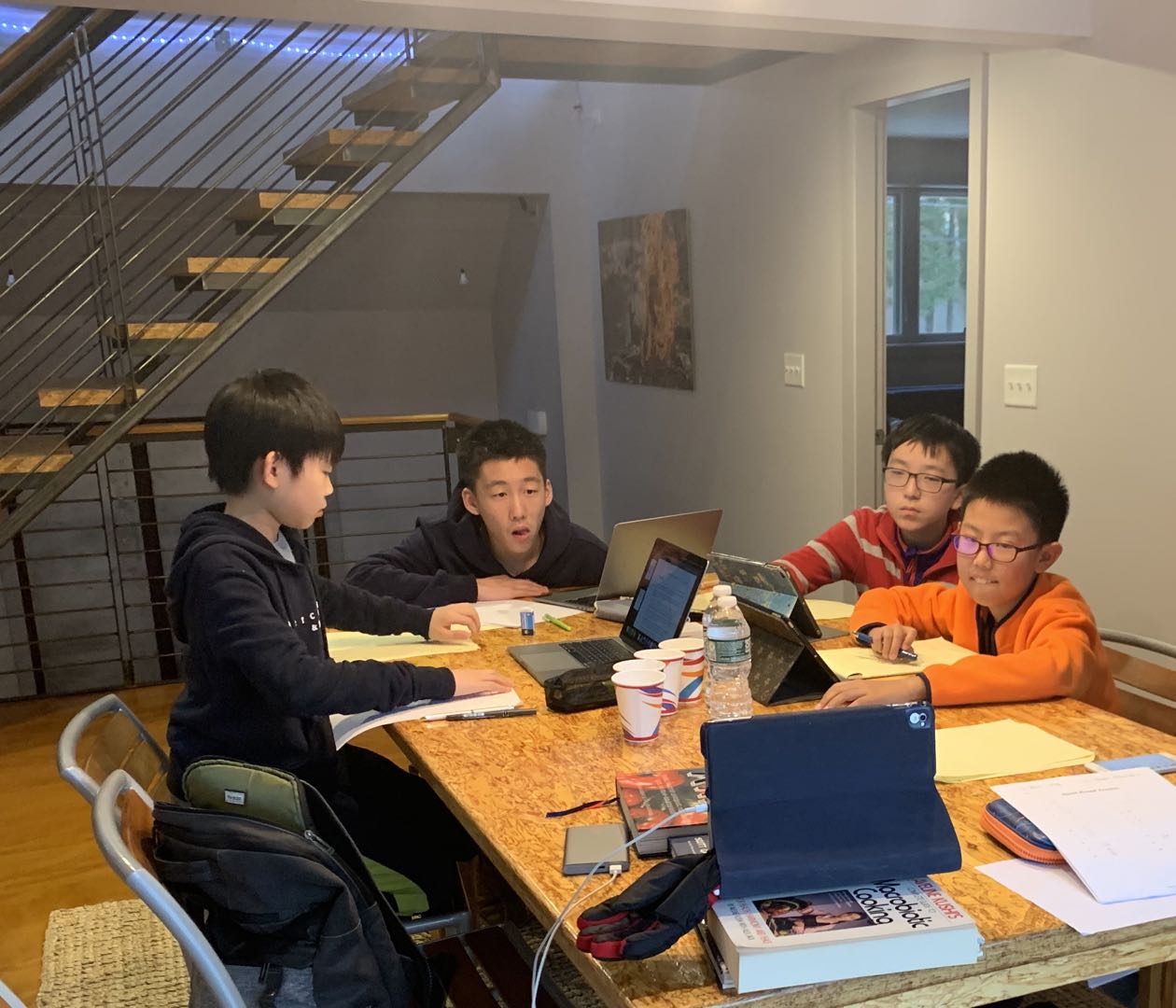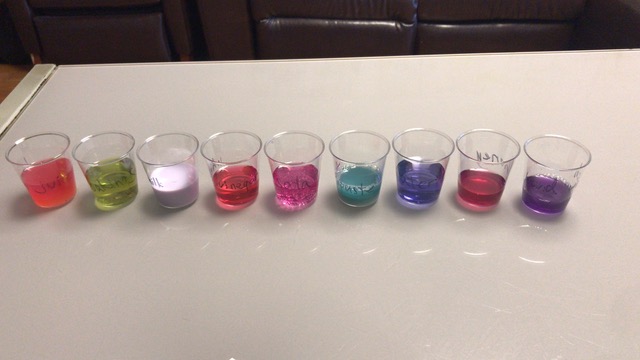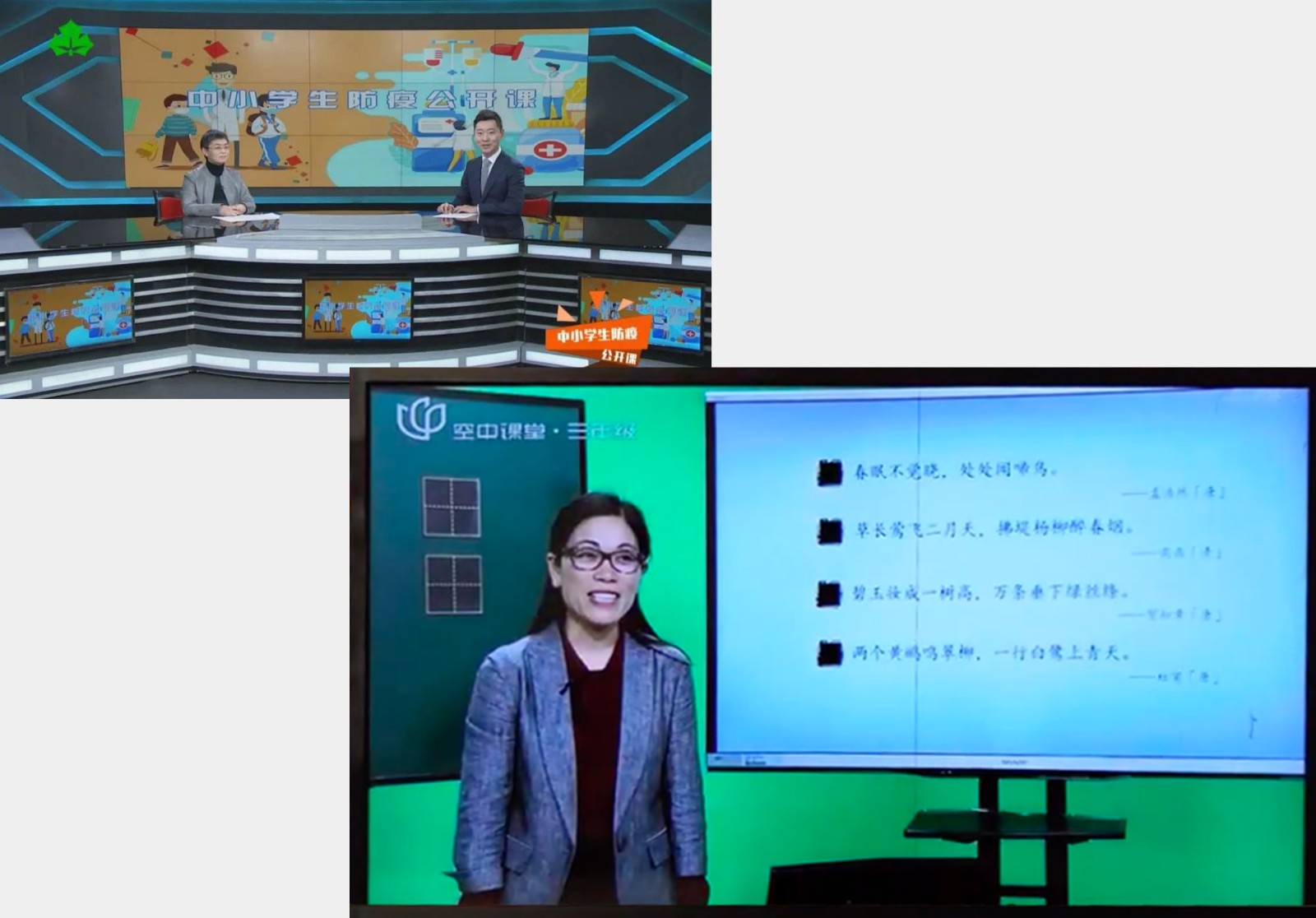The lessons of the Coronavirus outbreak will take longer to outwork but I predict it will not spark the end of schools. However, it will accelerate greater use of blended learning (online alongside formal) that uses online and the advances in AI much more, may well disrupt the shape of the school day and will personalise the curriculum experience of individual students. Schools of the future will be different beasts to the structures we see today. It is not impossible that in ten years’ time we will look back and thank the virus for precipitating a process of change that needed a kick-start. ——David Mansfield, Executive Headmaster
Dear Parents,
Two months ago, very few of us had actually heard of the Coronavirus (or Covid-19 as it has come to be known). Bird Flu, Swine Flu, SARS, MERS, yes – so the concept of an aggressive epidemic was by no means alien, and many of us have lived through previous scares. But this one has hit hard and gone global. Figures of cases in Europe, the US, the Middle East are climbing alarmingly. Our thoughts are still with the people of Wuhan, and Hubei in general, who have taken the vast brunt of the outbreak here in China, but they are turning also to other parts of the globe, where protocols are nowhere near as stringent as we’ve seen here in Shanghai.
China has responded very well to the crisis. As an expatriate educator returning to Shanghai in the midst of the pandemic, I have been impressed by the tight controls exercised from compound level upwards that have seen the virus contained and eventually dispersed. However, it has disrupted education in China in a major fashion, as it will in most other countries eventually. Closure of campuses for as yet undisclosed lengths of time has forced schools to take learning online. China is now responding to the possibility of reinfection from overseas, especially as many look to return home for safety as well as because schools, universities and workplaces begin to close across the planet. Schools may remain closed for a while. But during this closure a quiet revolution has begun. The virus has changed ‘how we do school’, at least for a period of time, but perhaps forever.
Futurologists have been predicting the end of the bricks and mortar school for many years. They see the digital and AI revolutions as doors opening to a brave new world in which online, machine-driven learning replaces the traditional teacher-facilitated classroom. These shifts have been slower in coming than many expected because teaching, though very much enhanced by great technology, remains a people-centred business. Children learn by being and working together as the Social Interaction theorists affirm, and learning is facilitated best in a context of strong teacher-student relations which encourage, cajole and monitor pupil progress.
Yet the Coronavirus may yet be accelerating trends which had previously only been below the surface. At Pao School on all three campuses, staff ingenuity and innovation have come to the fore as we deliver the curriculum to the best of our ability.
Two approaches, synchronous (where the teacher and students are together virtually on an online platform for a set period of time) and asynchronous (where teachers provide work and resources, including individually produced videos, delivered remotely to be worked through by the student in their own time) have been used.
A wide range of platforms have been commissioned – our own core system (Power School Learning) has been central, but SeeSaw, NearPod, XY Link, Microsoft Teams, Zoom and even WeChat, as well as the traditional conference call and other social media products have also been utilized. Students have supported one another through well-embedded online connectivity, and many seem to be thriving in this virtual world of learning from home, or even from a holiday home outside China. Even management systems and meeting structures have gone online and worked quite effectively. Though the campuses are closed, the School is very much open.
Two heads are better than one:
Y7 students form study group
Y7C Joseph, Ronald, Albert, and Y7E Condy from YK Pao Middle School had planned to participate in a math competition in the United States. However, following the outbreak of the novel coronavirus, the competition was canceled. Some Pao students and their parents had to stay in the U.S. for longer than planned because of flight cancellations and other reasons.

During this period, Y7C students Joseph and Ronald, who were also classmates in New York, decided to make the best of the situation and formed a two-person study group. Joseph's mother noted that in spite of the frustration everyone felt after the competition was cancelled, as well as the anxiety about the sudden escalation of the COVID-19 outbreak, YK Pao School did a good job arranging online learning for its students, sending textbooks to the children and conducting successful classes, with plenty of interaction between teachers and students.
Currently, middle school students at Pao School are learning new content according to the curriculum. Instruction is given online through XYLink. Students can also participate in class or group discussions using tools such as Power School Learning, email, and WeChat groups.
Joseph and Ronald said: "It's really helpful to study together as a group. Compared to studying individually, we have more discussion, can better focus our attention and we can keep an eye on each other. Since we often do group projects at Pao School, this way of learning feels completely natural." They also feel that online learning leaves them with ample free time. Once they have completed their e-learning tasks, they use their free time to browse websites about math or science, read books or watch television.
The children are diligently studying online together and managing their time well. They have made the best of this situation: We can see how they have grown since the virus first broke out.
—— Joseph's mother
It seems more than likely that this virus-inspired online learning experience, predicted for years, will begin to gain real credibility. I will be amazed if remote learning does not suit many of our students well, especially our older ones. It provides more flexibility to fit basic school learning in alongside the many hobbies and parallel learning programmes they are following outside of school. It allows them to work at their own pace, and to undertake tasks differentiated to meet their needs and interests. It should develop real self-regulation and encourage many of the learning attributes that we at Pao School are seeking to inculcate in our students.
I have referred before to a key text written in the US last year by Strixrud and Johnson, ‘The Self-Driven Child’. These are young people who have developed the independent learning skills and character to thrive at university and in the world of work. It is by no means impossible that remote learning could enhance some of these skills faster than the sometimes overly cossetted learning environment they can experience in formal education.
High School: Science experiment
Online learning has been difficult for both students and teachers. Teachers have faced a number of challenges – such as issues with connection, both technologically and on an interpersonal level – in making the lessons engaging for students. They have found that there are also more distractions at home and planning requires more work to keep the lessons creative and interesting for students.
Science teachers were challenged by lack of access to laboratories and that, due to the quarantine, it was difficult for students to get scientific materials for experiments. As a result, teachers need to develop lessons that used items that students already had accessible in their homes.
High School science teacher, Steven Varty, notes that despite the initial challenges with online learning the students have adapted well. Concerned about student engagement, Mr. Varty and his fellow teachers were inspired to try out a series of chemistry experiments to promote hands-on learning, add creativity to their lessons and to get the students away from their computer screen. “We wanted to create something that they actually remember and say, ‘Oh that’s why we learned that, that’s why what we learned is important’,” he says.
The students were asked to conduct two experiments: the first being to use red cabbage as a pH indicator for various household liquids and the second to use vinegar to break down the shell from an egg - leaving it similar to a bouncy ball.

Mr. Varty also highlighted that a benefit to this type of activity was that it could be adapted for different ability levels,
There is almost no ceiling for the top students, some of them go way beyond what is necessary. The more interested they get, the more they open new doors, they see new ideas – which opens more new doors.
He was particularly impressed with a student who, out of scientific curiosity, chose to record a 24-hour time-lapse of the changes to his egg.
Y8 TudingDespite the success of this project, Mr. Varty can’t wait to get back in the classroom, highlighting that online learning has one major downfall that can’t be replicated online – he misses in-person interaction and connecting with his students.
There are arguments against online learning. Many of them explain why it will never completely replace physical schools of gathered leaners and teachers. Students can drift, become distracted and off-task. They can struggle with conceptual or cognitive hurdles that they need a teacher to overcome. They can become lonely and disorientated away from other children. They may just not be mature enough to handle the demands of self-regulation. It is clear that younger students find online less effective than the more traditional classroom, with a teacher on hand to support them and guide their interactions and learning experiences. These are powerful concerns. Now we are obviously addressing these during this period.
Staff are teaching some classes direct to the children using XY Link and Zoom. Work is being submitted and marked with feedback online. Helpdesks and chatroom response facilities enable students to have access to teacher remotely (possible more efficiently than when they are in the same building). Most tutors and homeroom teachers are touching base daily with their charges via communication platforms and other digital media. So many of these concerns are being removed. Despite its shortcomings, online learning is working well.
Adjusting teaching plans to
provide the best learning possible
YK Pao School has strictly implemented the government's requirement of "suspending classes without stopping school" and various departments have endeavored to ensure that students can learn online smoothly. In late February, at the guidance of the Shanghai Municipal Education Commission, Pao School organized for all teachers and students to view the "Virtual Classroom" pilot class online and mailed textbooks to all students. Online teaching plan was formulated by combining government requirement, the school's unique teaching approach and learning needs of the students.
Compared to older students, primary students require more attention and guidance in independent learning. Since the launch of online education, primary school has listened to parents' feedback and worked to optimize teaching plans in an effort to provide the best learning experience for students and families.

"Virtual Classroom" program
At present, children in the Primary School are studying through the online teaching program provided by the Shanghai Municipal Education Commission, as well as the school's online platforms XYLink and Power School Learning and online live sessions. Teachers have adjusted the teaching plan in accordance with the different learning needs of students, which vary considerably based on age.
For example, to optimize the learning experiences and participation of Y1 and Y2 students, online classes are limited to between 5-9 students per session. In upper primary school, where students are more adept with the technology, a Y5 English teacher invited students to develop an ode* through real-time online collaboration using a shared document so that the children can work collaboratively.
Students developing an ode through real-time online collaboration
Another teacher posts reflection questions on PSL that drive her live sessions. She finds this improves participation and helps her get a sense of student progress. Across all year groups and subjects, teachers are finding creative and engaging ways to ensure that our young students get quality learning experiences in this challenging time.
* A formal, often ceremonious lyric poem that addresses and often celebrates a person, place, thing, or idea.
In my view, online digital learning will never completely replace physical schools in the future. Some of the face-to-face aspects of learning are essential, no matter how good the AI becomes at providing answers to student questions, and delivering the curriculum. Growing up as young people require interactions – ‘no man is an island, entire of itself’, said the English poet John Donne many years ago. We need human relationships. Learning theory explains that children learn from one another. School communities build values and social norms. Schools provide physical spaces and facilities for group activities, discussion, debate, sports, drama productions, music ensembles… just hanging out together. The curriculum may be easily transferred to the digital space, as too can some elements of online connectedness, but human development and character formation cannot. It needs good, well-trained teachers to bring this about. At an economic level schools release parents to the world of work, so home study, even if it functioned perfectly, would constrain other members of the family or redirect funds for child-care whilst parents worked. So, it seems schools have an educational and economic raison d’etre which is just not going away.
David Mansfield
Executive Headmaster of YK Pao School
During the past few weeks, we know a lot of you have composed music or practiced
musical instrument at home. If you would like to share with us, please email:
Paolife@ykpaoschool.cn.